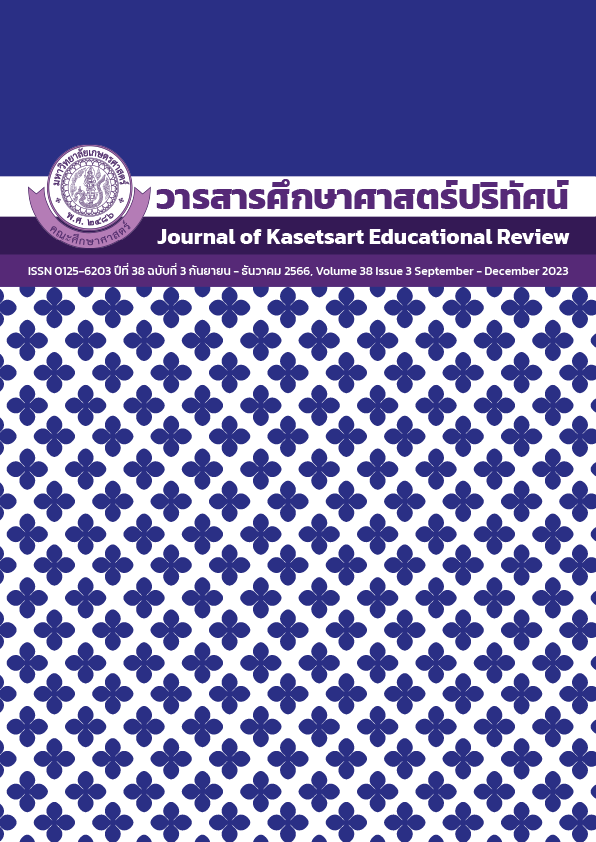การพัฒนาความเข้าใจแนวคิดเรื่องกัมมันตภาพรังสี ของนักเรียนชั้นมัธยมศึกษาปีที่ 4 โดยใช้การจัดการเรียนรู้ในรูปแบบ 6E ตามแนวทางสะเต็มศึกษา
คำสำคัญ:
การจัดการเรียนรู้ในรูปแบบ 6E, สะเต็มศึกษา, แนวคิด, กัมมันตภาพรังสีบทคัดย่อ
งานวิจัยปฏิบัติการในชั้นเรียนนี้มีวัตถุประสงค์เพื่อพัฒนาแนวทางในการจัดการเรียนรู้โดยใช้รูปแบบ 6E ตามแนวทางสะเต็มศึกษาเรื่องกัมมันตภาพรังสี ให้นักเรียนชั้นมัธยมศึกษาปีที่ 4 มีการพัฒนาความเข้าใจแนวคิด เก็บข้อมูลและวิเคราะห์ข้อมูลเชิงคุณภาพโดยใช้แบบวัดความเข้าใจแนวคิด บันทึกหลังสอน บันทึกการนิเทศ บันทึกการเรียนรู้ บันทึกการสัมภาษณ์แบบกึ่งโครงสร้าง ชิ้นงาน ใบกิจกรรม และการสังเกตจากบันทึกวิดีโอ ผลการวิจัยพบว่า
แนวทางการจัดการเรียนรู้เพื่อพัฒนาความเข้าใจแนวคิด ได้แก่ 1) กำหนดสถานการณ์ปัญหาที่วางเงื่อนไขเกี่ยวกับกัมมันตภาพรังสีร่วมกับการกำหนดบทบาทสมมติของนักเรียน รวมถึงจัดบรรยากาศการเรียนรู้โดยจำลองสถานการณ์จริงทั้งในและนอกห้องเรียน 2) อภิปรายแลกเปลี่ยนแนวคิดในการออกแบบเพื่อให้เกิดความเข้าใจแนวคิดทางวิทยาศาสตร์ที่ถูกต้อง รวมถึงให้ข้อคิดเห็นระหว่างกลุ่มเพื่อปรับปรุงและพัฒนาชิ้นงาน 3) ส่งเสริมการใช้สื่อที่หลากหลายและมีความเฉพาะเจาะจงกับเนื้อหาเรื่องกัมมันตภาพรังสี เพื่อกระตุ้นการคิด ส่งเสริมการเรียนรู้ และเชื่อมโยงความรู้เดิมไปสู่ความรู้ใหม่ 4) สร้างความร่วมมือระหว่างนักเรียนกับนักเรียน นักเรียนกับครู และครูกับครู เป็นการส่งเสริมกระบวนการได้มาซึ่งความรู้ทางวิทยาศาสตร์ และผลการพัฒนาความเข้าใจแนวคิดของนักเรียนพบว่า นักเรียนมีความเข้าใจแนวคิดเรื่องประโยชน์และโทษของธาตุกัมมันตรังสีมากที่สุด รองลงมาคือแนวคิดเรื่องครึ่งชีวิต และแนวคิดเรื่องความหมายของกัมมันตรังสี ตามลำดับ จากผลการวิจัยแสดงให้เห็นว่ากิจกรรมการเรียนรู้โดยใช้รูปแบบ 6E ตามแนวทางสะเต็มศึกษา สามารถพัฒนาแนวคิดเรื่องกัมมันตภาพรังสี ของนักเรียนชั้นมัธยมศึกษาปีที่ 4 ได้
เอกสารอ้างอิง
Barke, H.-D., Hazari, A., & Yitbarek, S. (2009). Misconceptions in chemistry: Addressing perceptions in chemical education. Berlin: Springer.
Burke, B. N. (2014). The ITEEA 6E Learning ByDesign™ Model: Maximizing Informed Design and Inquiry in the Integrative STEM Classroom. Technology and Engineering Teacher, 73(6), 14-19.
Chatsuriyawong, S. (2016). Instructional of Stem Education Local Integrat. Silpakorn Educational Research Journal, 13(2), 132-144. [in Thai].
Chiu, M.-H., & Lin, J.-W. (2005). Promoting fourth graders' conceptual change of their understanding of electric current via multiple analogies. Journal of Research in Science Teaching, 42, 429-464.
Faikhamta, C. (2016). Classroom Action Research in Science Classroom. Bangkok: Institute of Academic Development (IAD). [in Thai].
Kemmis, S. & McTaggart, R. (1998). The action research reader (3rd Eds.). Geelong: Deakin University Press.
Kennedy, T.J., & O'Dell, M.L. (2014). Engaging Students in STEM Education. Science Education International, 25(3), 246-258.
Kessler, G., Veser, A., Schlüter, F-H., Raskob, W., Landman, C., & Päsler-Sauer, J. (2014). The Risks of Nuclear Energy Technology. Springer Berlin, Heidelberg.
Krutngoen, S., & Eiamguaw, P. (2021). The Effect of Integrated STEM Education Inquiry-Based Learning and Attitude to word Science Lesson of Mathayomsuksa 3 Students. Social Sciences Research and Academic Journal, 16(3), 189-202. [in Thai].
Lai, C.S. (2018). Using Inquiry-Based Strategies for Enhancing Students’ STEM Education Learning. Journal of Education in Science, Environment and Health, 4, 110-117.
Lertcharoenrit, T., Pimthong, P., Kityakarn, S., Munprom, E., & Ugsonkid, S. (2020). The 12th Grade students’ STEM understanding in the topic of PM 2.5. Kasetsart Educational Review, 35(3), 176-188. [in Thai].
Maniam, S., & Pruekpramool, C. (2020). Development of a STEM Education Learning Unit on Geological Resources to Enhance Collaboration Skills and Learning Achievement for Eight Grade Students. Journal of Social Sciences and Humanities Research in Asia, 26(3), 97-133. [in Thai].
Nilayon, S., & Nilayon, D. (1996). Nuclear Power and Development in Thailand. Bangkok: Chulalongkorn University Printing House. [in Thai].
Office of Atom for Peace Ministry of Science and Technology. (2005). The Radiological Accident in Samut Prakarn. Bangkok: Teachers' Council of Trade Organization. [in Thai].
Rakphonlamueang, C. (2014). Scope of Development Studies. Bangkok: Winyoochon. [in Thai].
Roth, W.M. (2001). Learning science through technological design. Journal of Research In Science Teaching, 38(7), 768-790.
Sanders, M. (2009). STEM, STEM education, STEMmania. The Technology Teacher, December/January.
Seeprasong, C., Prakongsup, T., & Puckdee, W. (2021). The Development of Grade 〖"10" 〗^"th" Students’ Scientific Concepts of Cell Division and Satisfaction through Science, Technology, Engineering and Mathematics (STEM) Education by 6E Learning Cycle. Silpakorn Educational Research Journal, 13(1), 402-420. [in Thai].
Sesen, B., & Ince, E. (2010). Internet as a source of misconception: "Radiation and radioactivity". Turkish Online Journal of Educational Technology, 9(4), 94-100.
Sukkho, S., Bongkotphet, T., & Bongkan, T. (2015). Effect of Learning Outcome Using Conceptual Change Teaching Strategy in Radioactivity and Nuclear Energy Topics for Matayomsuksa IV Students. Journal of Community Development Research (Humanities and Social Sciences), 8(1), 83-93. [in Thai].
Tekin, B. B., & Nakiboglu, C. (2006). Identifying Students' Misconceptions about Nuclear Chemistry. A Study of Turkish High School Students. Journal of Chemical Education, 83(11), 1712.
Tytler, R., & Peterson, S. (2000). Deconstructing learning in science—Young children's responses to a classroom sequence on evaporation. Research in Science Education, 30(4), 339-355.
Wongsa, S. (2014). Factors Affecting the Behavioral Intention to Use Eco-friendly It Case Study of Rajabhat University Member Perspective in Bangkok Metropolitan Area [Master’s independent study, Thammasat University]. http://digital.library.tu.ac.th/tu_dc/frontend/Info/item/dc:144121. [in Thai].
ดาวน์โหลด
เผยแพร่แล้ว
ฉบับ
ประเภทบทความ
สัญญาอนุญาต
ลิขสิทธิ์ (c) 2023 วารสารศึกษาศาสตร์ปริทัศน์

อนุญาตภายใต้เงื่อนไข Creative Commons Attribution-NonCommercial-NoDerivatives 4.0 International License.
บทความทุกบทความเป็นลิขสิทธิ์ของวารสารคณะศึกษาศาสตร์ มหาวิทยาลัยเกษตรศาสตร์ วิทยาเขตบางเขน
วารสารศึกษาศาสตร์ปริทัศน์ (Kasetsart Educational Review)






